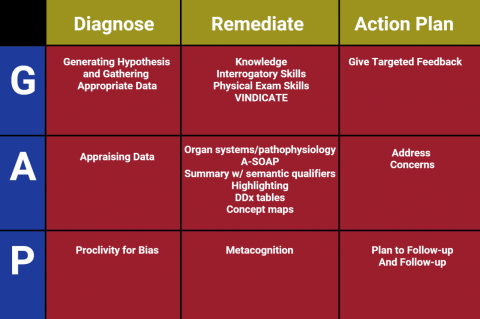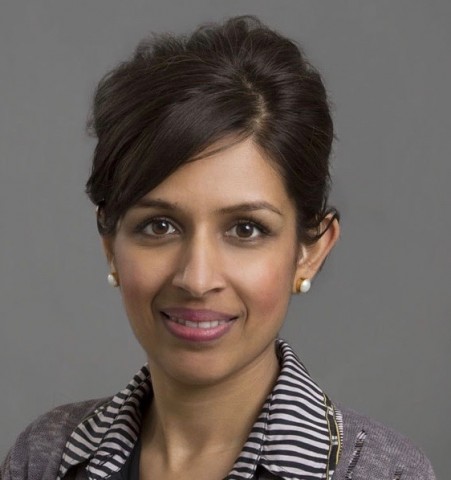At the end of a case presentation, you ask your learner “what’s the patient diagnosis?”, and you think to yourself “what’s the learner diagnosis?”
Consider the GAP in clinical reasoning. Focus on the following:
- Generating Hypothesis and Gathering Appropriate Data – identified by poor problem representation; difficulties in generating hypotheses; identifying cues and directed data gathering
- Appraising Data – identified by difficulties in building an overall picture; difficulties in prioritizing; difficulties in elaborating a management plan
- Proclivity for Bias – premature closure; availability; confirmation
Learners may have more than one deficiency. Consider the following remedial exercises:
- G– role play to demonstrate use of communication and physical examination skills; VINDICATEmnemonic to generate a broader hypothesis
- A– highlight pertinent information; develop concept maps for problems; explicitly demonstrate semantic transformation of problems
- P – discuss justification of main hypothesis and generate alternative hypotheses

References
- Audétat MC, Laurin S, Dory V, Charlin B, Nendaz MR. Diagnosis and management of clinical reasoning difficulties: Part II. Clinical reasoning difficulties: Management and remediation strategies.Med Teach. 2017 Aug;39(8):797-801. doi: 10.1080/0142159X.2017.1331034. Epub 2017 Jun 7.
- Weinstein A, Gupta S, Pinto-Powell R, et al. Diagnosing and remediating clinical reasoning difficulties: a faculty development workshop. MedEdPORTAL. 2017; 13:10650. https://doi.org/10.15766/mep_2374-8265.10650
Author BIO

Shanu Gupta, Bachelor Medicine, is a Medical Educator and Internal Medicine Hospitalist. Shanu currently holds a position as Assistant Professor at the University of South Florida. Shanu’s areas of professional interest include clinical reasoning, simulation and faculty development. Shanu can be followed on Twitter @shanumeisterand/or LinkedIn.
#MedEdPearls are developed monthly by the Central Group on Educational Affairs. Previously, #MedEdPearls explored topics including feedback, converting teaching into scholarship, and a different approach to questioning. Thank you for reading and enjoy the Pearls!
#MedEdPearls

Jean Bailey, PhD – Virginia Commonwealth University School of Medicine
Rachel Moquin, EdD, MA – Washington University School of Medicine

